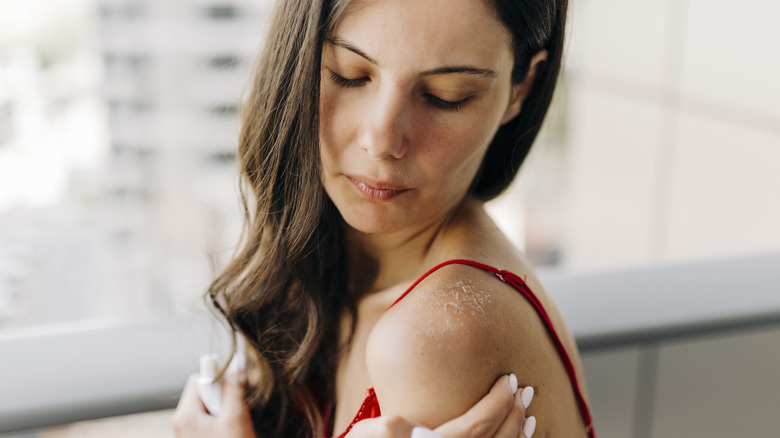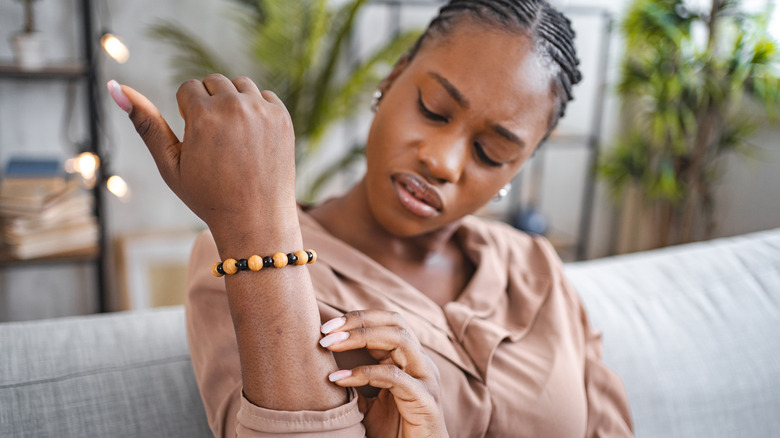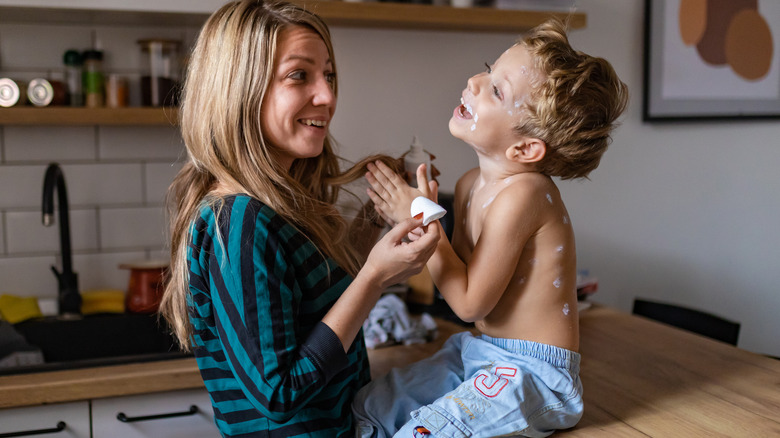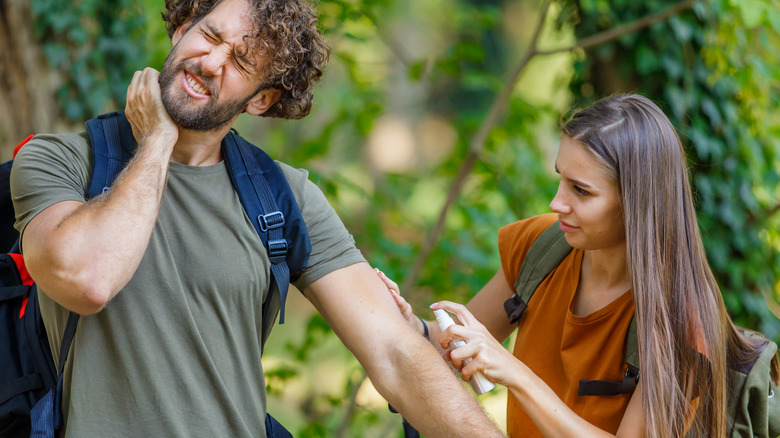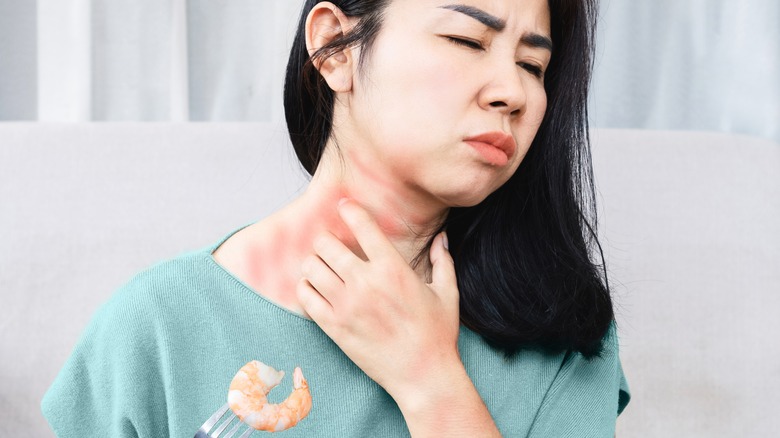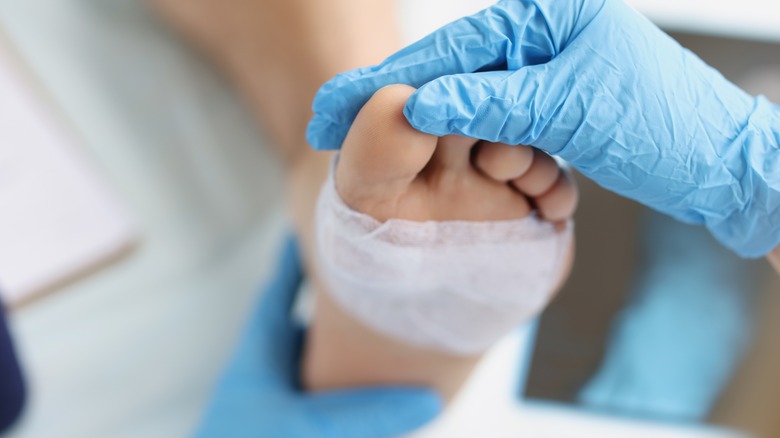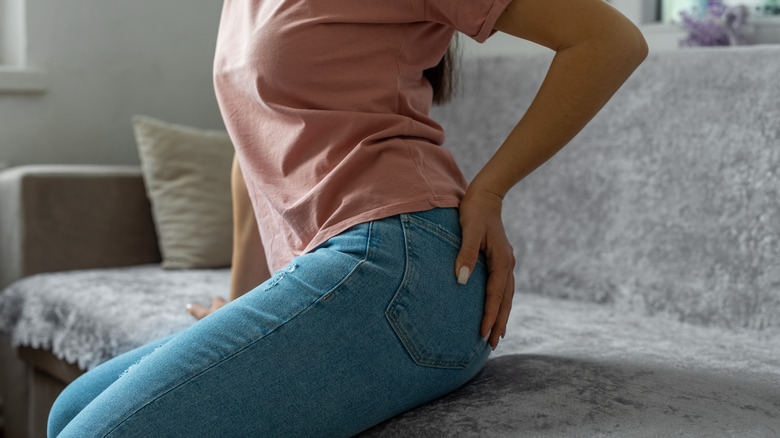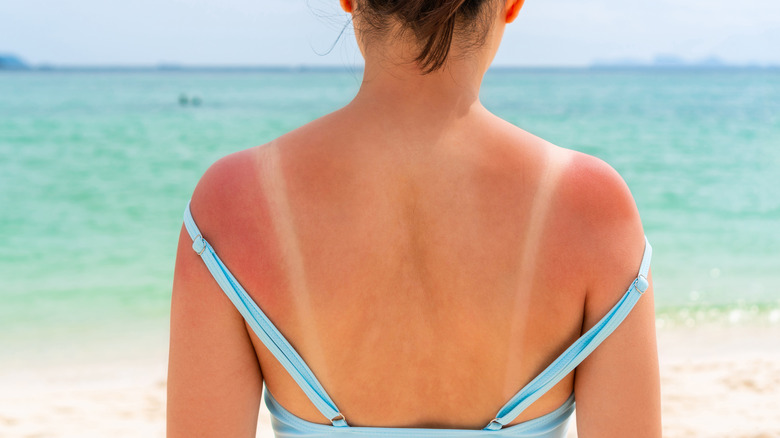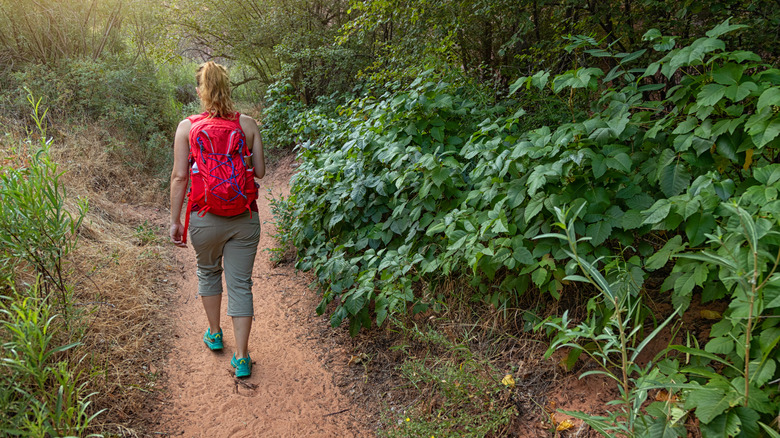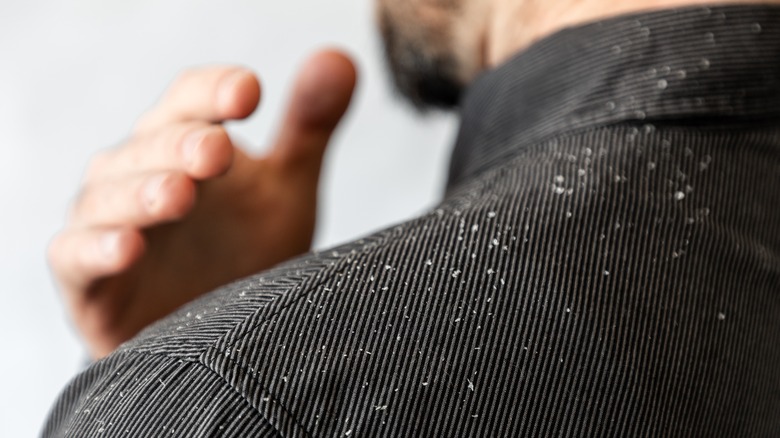Itchy Medical Conditions You Really Shouldn't Scratch
You can't make it through life without having an itch at one time or another. For example, brushing against a leaf during your run can create a tickle on your leg. A sock rubbing funny against your big toe can have you rubbing the area. Once you scratch it, the itch is gone. Sometimes, itchy skin is more than just a little tickle, and itching doesn't relieve the feeling. Pruritus is the term given to a recurring itch by the medical community.
Itchy skin can come from several conditions. And while your first instinct would be to scratch it, avoiding the temptation is necessary to help the healing process. For example, skin conditions like eczema, psoriasis, hand, foot, and mouth disease, bug bites, wounds, hives, and sunburns shouldn't be scratched to avoid worsening the inflammation. Avoid rubbing fungal and poison ivy infections since it can lead to spread and irritation. Hemorrhoids also need to be left alone.
Let us break down each condition and the symptoms beyond itching. We'll also go over ways to soothe the itch so that you can keep your sanity.
Eczema can be hard not to scratch
Eczema is a complex skin disorder characterized by itchy, dry skin. According to the National Eczema Association, people with eczema typically have overactive immune systems that are very susceptible to allergens and irritants. The most common form of eczema is atopic dermatitis, but you may also experience contact dermatitis, nummular eczema, and stasis dermatitis, among others. The kind of rash and triggers vary with each type.
WebMD notes that scratching eczema can make it worse. In addition to breaking open the skin and causing bleeding, it opens you up to bacterial skin infections. Signs of an infection can include oozing, inflammation, and crusts on the skin. It can also feel hot to the touch. As the infection advances, you might also feel feverish, per NHS. Broken skin can be infected with the herpes simplex virus, leading to fluid-filled blisters.
To avoid scratching, apply ice or a cool rag to the area. WebMD also states that mirror itching by itching the opposite side of your body can give the illusion to your brain that you're scratching the itch. Additionally, it can be beneficial to use thick lotions and topical ointments like hydrocortisone cream.
Psoriasis causes itchy buildup
According to the Mayo Clinic, psoriasis is a skin disease where the immune system causes the skin cells to grow faster than they shed, disrupting the normal skin cycle. Skin cells start to build up, leaving dry, scaly patches. Specific triggers, like cold weather and skin injuries, can activate psoriasis in any area of your skin. Those who succumb to a strep throat or skin infection can also see psoriasis flare up.
A study published in the Journal of Clinical and Aesthetic Dermatology found that the itch of psoriasis was so intense that it impacted the quality of life of those suffering from it by causing sleep disturbances and the disruption of emotional well-being. The itch from psoriasis typically comes from the flake scales and inflamed skin, per Healthline. As a psoriasis patient shared (via Plaque Psoriasis), "We are told from the beginning why we shouldn't scratch. We all know better. Yet, if you are like me, sometimes, you just can't help but scratch."
However, scratching can come with some severe consequences. For example, psoriasis can pop up when the skin is broken from itching, so scratching your plaques can lead to more plaques. Like eczema, breaking the skin can also open you up to viral and bacterial infections. Medications and ointments can help soothe the itch. But you can also try natural methods, like practicing relaxation techniques and taking cool showers. Healthline also suggests taking an antihistamine at night to sleep.
Hand, foot, and mouth disease comes with a hard-to-deny itch
You don't even want to "think" about itching hand, foot, and mouth disease (HFMD). Lori Noble, MD, a physician at Spruce Internal Medicine, told Penn Medicine, "Much like its name suggests, hand, foot, and mouth disease (HFMD) is caused by a contagious virus that classically affects your hands, feet, and mouth, but can actually cause a bumpy or blistery rash all over your body." The physician further explained that the rash can create sores in the mouth and even a rash covering the back and bottom. Given that it's easily spread, it is often caught by children at school and daycare, but it can also affect adults.
The first sign of the virus isn't the rash. Those infected begin with a fever and a feeling of lethargy. It transitions into painful, itchy sores on the body, per the American Academy of Dermatology Association (AAD). HFMD doesn't need any medication because it clears up within 10 days without intervention. Therefore, you'll want to prevent children from scratching by applying cold compresses and ointments like calamine lotion to their skin. It's also essential to keep them hydrated by giving them lots of fluids and keeping the pain at bay with over-the-counter (OTC) pain relievers.
Avoid scratching bug bites
It's not uncommon for people to suffer a few bug bites during outdoor activities like hiking with friends. You may have experienced this yourself, and you probably didn't even notice the itchy bumps on your legs until you hit the shower after a day of exploring.
A bug bite can come from an array of insects, like mosquitoes, bees, ants, and flies. The itch is due to the venom or saliva these bugs leave behind on the skin; it is treated like an allergen, and histamine is dispensed. Your immune system reacts with inflammation and an itchy lump or rash with a darker circle (via Healthline). Sometimes, this causes a large lump and swelling with an elevated reaction.
It's important to avoid scratching bug bites to prevent complications like skin infections. OTC pain relievers and antihistamines can help relieve the itch, per the AAD. You can also try applying OTC hydrocortisone cream. Home remedies for bug bites, like using baking soda and water, might help (via the Centers for Disease Control and Prevention). Lastly, see a healthcare professional for bug bites that worsen or develop a red bullseye circle or red streak climbing from the wound.
It's hard (but important) not to scratch hives
You know how itchy hives can be if you've ever experienced an allergic reaction. Also called urticaria, hives are welts on your skin due to a virus, infection, or allergic reaction. The Allergy Institute also notes that hives can result from stress, exercise, or sunlight. The itch can be so intense that the urge to scratch is nearly painful. Some types of hives can also sting, in addition to itching.
Hives appear when the body releases histamines, chemicals that the body uses as a line of defense against infections. Hives can come in different shapes and sizes, from tiny pumps to large welts. The Cleveland Clinic states they might also join together to form a plaque. Thankfully, hives are typically acute, meaning they hit when exposed to an allergen or stress and only last a few hours. But some people have chronic hives, which can last weeks.
It's natural to want to scratch hives when they itch so badly, and some can get hit with this urge worse than others. However, preventing yourself from scratching your hives is a must, since this act can cause them to spread, leading to a more intense itch. Try taking a lukewarm bath, applying ice packs, slathering on anti-itch ointment, or even wearing gloves if necessary. The Allergy Institute also mentions witch hazel and aloe vera for natural relief.
Leave stitches or healing skin alone
Getting stitches for the first time can be a traumatic experience — and unfortunately, the healing process can drive you batty with itching.
Healthline breaks down the itching based on the stages of wound healing. The first stage involves the clotting and sealing of the blood vessels with a scab. Large wounds can't heal independently and require stitches to keep them closed, especially after surgery. Inflammation sets in next, causing the itch to begin as the cells rush to the site and repair the skin. Nerve irritation and the release of histamines are primarily responsible for that urge to scratch.
The itch can be frustrating, but not scratching or picking at the scab is crucial. Disrupting the process can take you back to the beginning of wound healing, meaning the process would have to start all over again. In addition to trying antihistamines and cold compresses, distraction can be your best friend. Have a chat with your friends or immerse yourself in a craft instead of focusing too much on your itchiness.
Scratching hemorrhoids can have unpleasant consequences
Hemorrhoids are a medical condition of the anus that affects 1 in 20 Americans, according to the National Institute of Diabetes and Digestive and Kidney Diseases (NIDDK). These inflamed veins can affect the area around your anus (external hemorrhoids) and lower rectum (internal hemorrhoids). While internal hemorrhoids are generally painless, external ones can cause pain and itching.
Some people can be more prone to hemorrhoids than others, including those with a low-fiber diet, experiencing chronic constipation, or who are pregnant or of older age. In fact, the NIDDK notes that about half of people over 50 experience hemorrhoids. Johns Hopkins Medicine also states that genetics can be involved in developing hemorrhoids since those with a strong family history are more susceptible. Hemorrhoids create dips and valleys within the anus, making cleaning harder. Therefore, fecal matter can lead to itching. Inflammation and swelling can also exacerbate itching (per Medical News Today). Vigorous wiping or itching of the area irritates the vessels, making the itch worse.
OTC medications and suppositories can help, but you should try fiber supplements and a high-fiber diet. Soaking your bottom in a tub can also relieve irritation. As Dr. Howard LeWine, assistant professor of medicine, told Harvard Medical School, "Hemorrhoids can be troublesome and embarrassing, but they often shrink on their own with simple self-help care and over-the-counter remedies."
Don't scratch a sunburn
Nothing is better than a day at the beach or a walk through the park with your friends, soaking up all the rays. However, you missed applying sunscreen on the middle of your back, an area that you couldn't reach. A short time later, you begin to experience the worst itch you've ever felt in your life.
While sunburns usually only lead to a mild itch and irritation, bad sunburns can cause an unrelenting itch and pain, known as hell's itch. "Hell's itch is this deep, painful, almost throbbing, itch that happens one to three days after a sunburn, often on the upper back and shoulders," dermatologist Melissa Piliang, MD, told the Cleveland Clinic. This type of itch can happen to anyone, but Piliang noted that fair people and those closer to the sun might have struggled more with this healing. Per Benadryl, hell's itch doesn't happen to everyone, but it could be due to the damage to the outer layer of skin. Healthline clarifies that genetics can also come into play.
In addition to medication and ointments, it can be helpful to soak in an oatmeal bath and apply aloe to the burnt skin. The Cleveland Clinic also recommends staying hydrated by drinking electrolytes. Pilang added, "Be really careful not to scratch the itch because it doesn't relieve it at all and often makes it worse. You can also create tears in your skin that can be a portal of entry for bacteria and could lead to infection." Making sure to wear sunscreen and sun protection can avoid this itch altogether.
Resist the urge to scratch poison ivy and sumac to avoid spread
Walking in the woods can cause an itchy rash if you encounter poison ivy or sumac. These natural plants grow in North America in wooded and marshy areas, according to WebMD. The plants themselves aren't dangerous, but the substance they produce is. Poisonous plants, like poison ivy, have a sticky oil called urushiol. It reacts when it touches your skin, causing blisters, a rash, and itching.
Poison ivy doesn't hit immediately the moment you touch it. Therefore, the AAD recommends acting fast if you've rubbed against it. You'll immediately want to use rubbing alcohol or dish soap to remove the oils from your skin. It's equally important to make sure to wash your nails. The itch of a poison ivy or sumac rash spreads because your fingers move the oils around. The Federal Food and Drug Administration (FDA) also notes that scratching can open you up to bacterial infections.
The itch from a poison ivy rash can be brutal, but the FDA recommends calming it with aluminum acetate or baking soda. You can also apply a protectant to your skin. Specialized creams, like Ivy Dry, can help to dry up the outbreak faster.
Fight the urge to scratch fungal infections
Dandruff is more than just a little dry skin on your scalp. It's caused by a fungus that naturally lives on the skin called malassezia. According to WebMD, your immune system can overreact to the fungus, causing issues. This leads to flaking and an irritating itch all over your scalp. It can also result in seborrheic dermatitis, an itchy condition that moves beyond the scalp to the face, chest, and back. Scratching makes the skin flake off and itch more. Research in Frontiers in Cellular and Infection Microbiology states treatment is ongoing, since this condition is chronic. However, topical antifungals and various salts are beneficial for clearing up the overgrowth of the fungus.
While malassezia might create an itchy scalp, tinea pedis results in itchiness on the foot and between the toes, known as athlete's foot. This fungus loves warm places, so the feet are a great place for fungi to grow (via Penn Medicine). You might pick up the fungus from locker room floors and pool surfaces. You're also at a greater risk if you share shoes or socks with others. Athlete's foot causes burning, itching, stinging, and blisters. The sores can get crusty and ooze as well. Scratching this condition can make it worse and set the treatment process back. It can also spread the fungus to other areas of the foot. Treatment with antifungals is typically effective in curing an outbreak.

